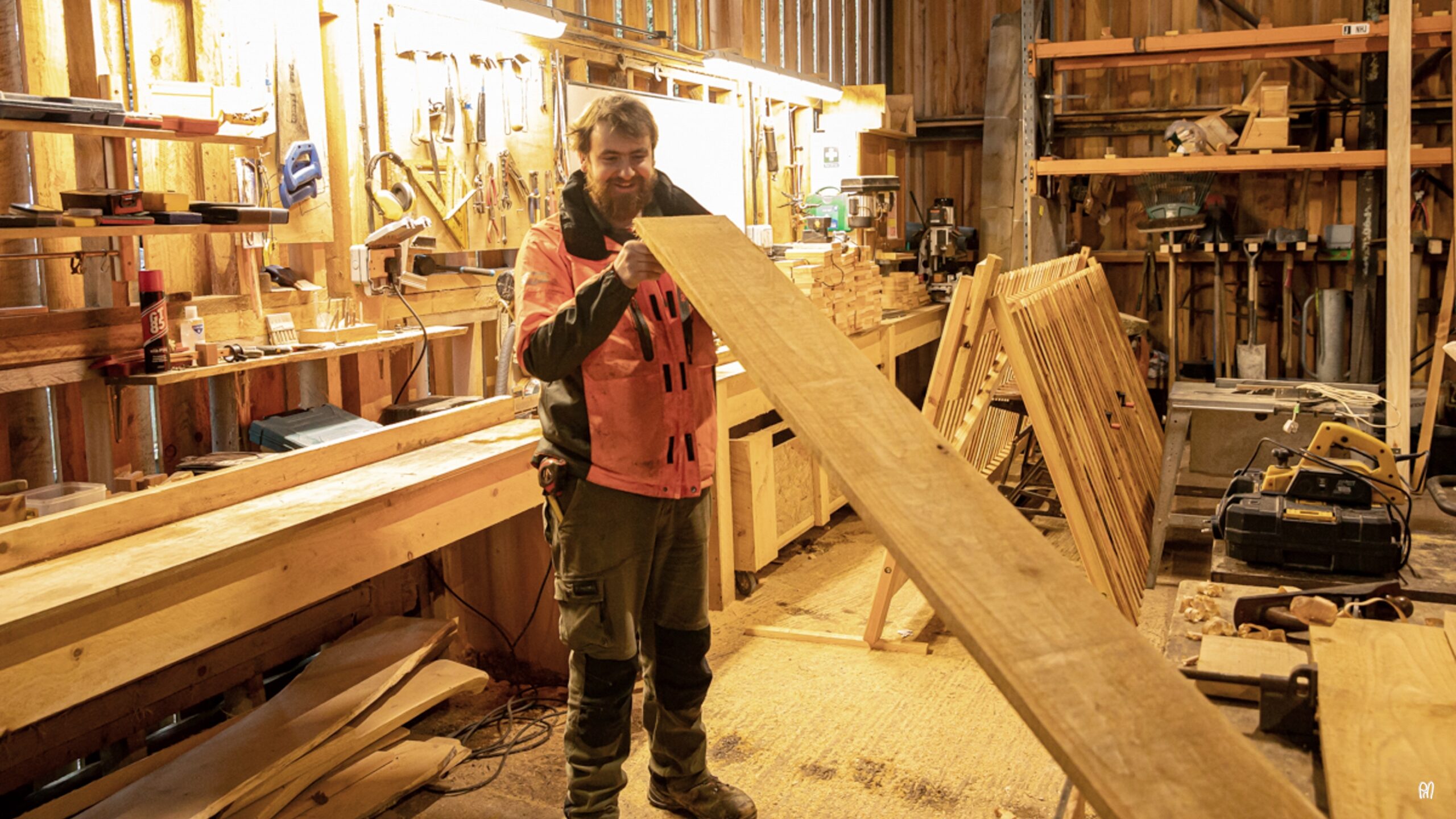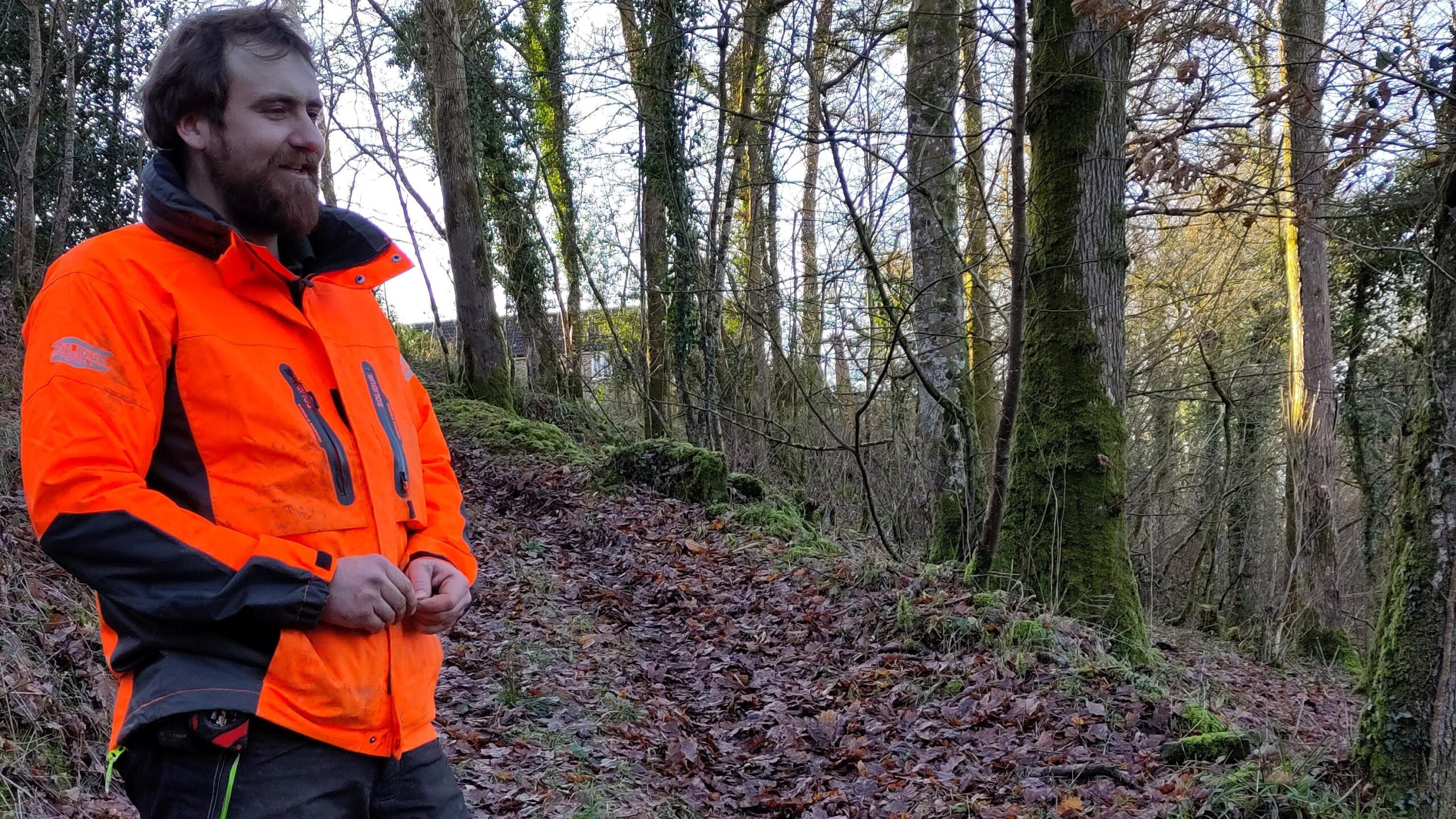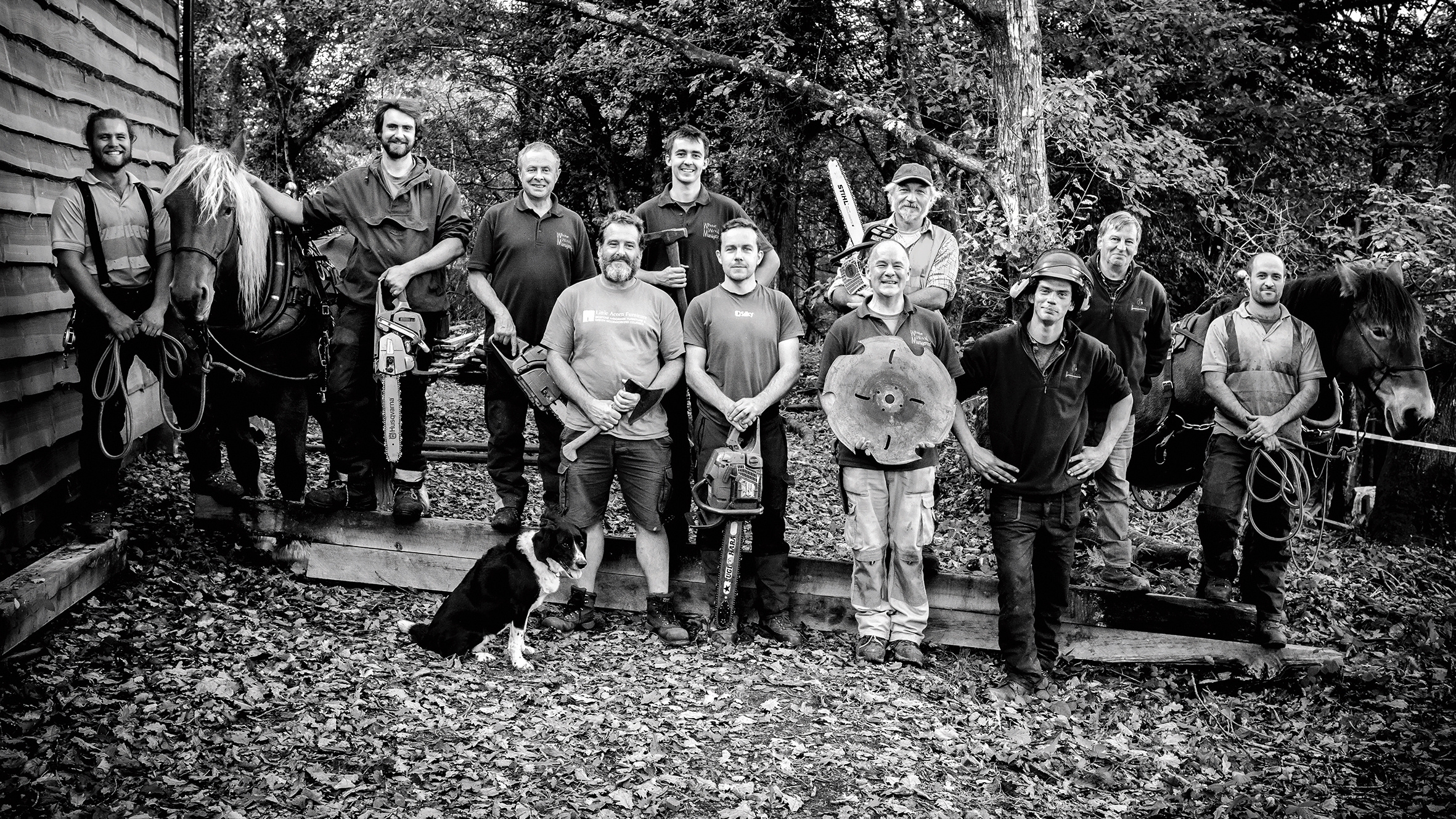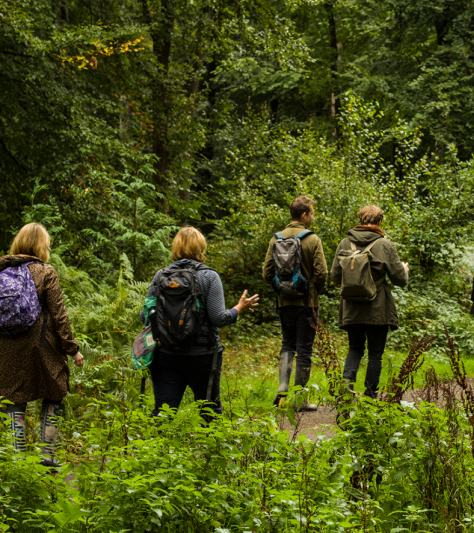From Forestry Roots to Woodlands Operations Manager
Forestry Roots 2019 participant Jack Hunt is now Woodlands Operations Manager for White Wood Management & Devon Timber. In the past 4 ½ years, 22 trainees have completed the Forestry Roots programme. In this occasional series of blog interviews we follow some of their careers.

Above: Jack Hunt inspects planks. Picture Credit Paul Moody
Jack Hunt successfully landed an RFS Forestry Roots post in 2019 with Exmoor National Park. This led to a two-year post with the National Park as a Woodland Conservation Assistant.
He has since become Woodlands Operations Manager for White Wood Management & Devon Timber and proud holder of the RFS Certificate in Forestry.
He says: “The Forestry Roots position gave me new skills and knowledge and a lot of confidence. It also gave me a wider network of contacts in the forestry industry, and I wouldn’t be where I am now without having had that experience.”
Tell us about your job role today and what it involves?

Above: Jack Hunt: “Half of my role is woodland management, the other half is production.” Picture credit Paul Moody.
White Wood Management & Devon Timber (WWM) is a joint woodland management consultancy and timber business based in the Fingle Valley in Devon.
My position as Woodland Operations Manager comes with a wide-ranging set of responsibilities, and I have a hand in everything the company does. Half of the business is woodland management –surveying, writing management plans for private clients and planning felling operations. The other half is the production, drying and sale of dimensioned timber (with WWM’s portable swing-blade sawmill) and also making bespoke countryside furniture in the workshop.
The core of my job is managing the operational side of things – it’s my responsibility to make sure things happen how, when and where they’re meant to happen.
Much of our work is in conjunction with the Woodland Trust (WT) restoring Plantations on Ancient Woodland Sites (PAWS) in and around Dartmoor National Park. We also manage and coordinate their regular volunteer groups, carrying out tasks such as control of conifer regeneration and bird box monitoring.
The work is highly variable based on the time of year and what we’ve been approached to do. We are currently spending much of our time using our sawmill and WT sawlogs to produce timber for the Mires Project, a multi-agency funded scheme hosted by South West Water which uses leaky wooden dams to rewet areas of upland peat.
What do you most enjoy about your role?
The variety! The fact that I’m involved with trees and timber in almost every way possible, ranging from the intellectual challenge of managing trees and woodlands to using my practical skills, carrying out felling and using the timber in the workshop.
In any one week I could be advising clients on Countryside Stewardship grant schemes one day, milling up some locally grown oak the next, and designing and making a bespoke gate the next. It is incredibly fulfilling to turn timber into aesthetically pleasing and long-lasting items which in turn help both with locking up carbon and enabling the management of small woodlands. The ethos of WWM is to help provide a market for timber from local woodlands which would otherwise be unmanaged, with all the economic and environmental benefits which stem from that.
Another great thing about the world of forestry and timber is that I get to work with a wide variety of people coming from wildly different backgrounds who have a huge variety of skills and knowledge – I never stop learning!
When did you know you wanted to work in woodlands and forestry?
I’d always had a general interest in countryside management and traditional crafts. Reading John Seymour as a teenager gave me an interest in the link between the management of primary resources and the vanishing skills of craftspeople who were inextricably linked to the land.
I tried a few different routes to make a living out of this interest: I did diplomas in blacksmithing, in woodcarving & furniture making, and in joinery, as well as a Foundation Degree in archaeology.
I ended up working with White Wood Management on a self-employed basis. During this time I started working towards the RFS Certificate in Forestry, and completed a diploma in Forestry and Arboriculture. I was also doing self-employed work as a joiner and as an arborist ground worker.
This experience gave me a hankering to finish my degree and see what the world of the decision-making side of forestry was like. I completed a top-up BSc (Hons) in Wildlife Conservation in 2019 and the RFS Roots graduate position with Exmoor National Park Authority (ENPA) came up.
My Forestry Roots role was as Assistant Forest Manager. The RFS subsidised me to do short courses relevant to my position. I chose to study tree inspection, 4×4 driving, continuous cover forestry and the FISA Forest Works Manager course.
After six months, a new position as Woodlands Conservation Assistant came up; I applied and was accepted. This meant a slightly higher level of responsibility. It also included the planning of a new 12ha woodland on the ENPA estate, the establishment of a new tree nursery and the project management of the ENPA ash dieback mitigation programme.
Would you have been where you are today without Forestry Roots?

Above: Jack with the Fingle Wood tree fellers. Picture Credit Paul Moody
The Forestry Roots programme gave me a step up to where I wanted to be in the world of forestry. It allowed me to experience woodland management within a National Park setting and gave me a taster of the world of management of woodland for conservation. I got a good general understanding of what for me had been the other side of forestry – the decision-making side.
After the Covid pandemic and home-working, I realised that spending most of my working week in an office wasn’t for me; I felt that I was delegating much of the fun work to others and neglecting my practical side. I wanted to combine the various aspects of my skillset, keeping one foot in the decision-making side of things and the other foot grounded in practical work and hence applied for my current position back with WWM.
The Forestry Roots position gave me new skills and knowledge and a lot of confidence. It also gave me a wider network of contacts in the forestry industry, and I wouldn’t be where I am now without having had that experience.
What are your career hopes for the future?
I’m both a forester and a woodworker, and I’m happy to have a chainsaw-boot in both worlds! My ambition is to keep learning about woodland and timber and to stay involved at all stages – from tree to finished product. It’s also important to me to share and promote my passion and what skills I have with others, and I hope this can play a bigger part in my future career.
It’s important to me that there’s a strong link between the growing and tending of forests and the use of the final product; I view the working of woodlands as having a direct and tangible benefit to the local economy and community. That link needs to be strengthened and maintained through an expansion of skills in the industry and greater use of locally grown timber from well-managed woodlands.
Forestry is a very special profession which can make use of all kinds of skills and knowledge. It is an incredibly diverse industry which can make use of a whole gamut of skills, from project management to pole-lathing and from chainsaws to mensuration charts. To anyone interested in a varied career where you can learn something new every day and also have a positive impact on the world, forestry is a great career choice.
Forestry Roots matches college and university leavers with employers for their first paid employment. It is a project made possible by the support of the ALA Green Charitable Trust and of members who have hosted posts over the years.
Find out how Isaac Carr has progressed from Forestry Roots to Tree and Woodland Inspector with Lancashire County Council.
More great Forestry Roots opportunities will be posted on our Jobs Board later this year.

